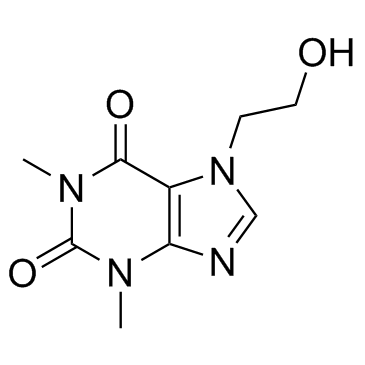Pharmacological studies in animals of beta-hydroxyethyltheophylline, the major metabolite of doxofylline in humans.
J S Franzone, R Cirillo, M C Reboani
Index: Methods Find. Exp. Clin. Pharmacol. 13(4) , 289-99, (1991)
Full Text: HTML
Abstract
beta-HET (beta-Hydroxyethyltheophylline), the major metabolite of the antibronchospastic, antiasthmatic drug doxofylline was studied in several in vitro and in vivo trials to characterize its pharmaco-toxicological profile. When compared to the parent compound, beta-HET was found to be significantly less active. It was also discovered to be a very weak inhibitor of phosphodiesterase activity. Its affinity for A1- and A2-adenosine receptors was even lower than that of doxofylline, which was quite low. The oral toxicity of beta-HET was about three times lower than that of doxofylline. The pharmacological activity of doxofylline is due to the drug in its original form and not to its major metabolite.
Related Compounds
| Structure | Name/CAS No. | Molecular Formula | Articles |
|---|---|---|---|
 |
7-(2-Hydroxyethyl)theophylline
CAS:519-37-9 |
C9H12N4O3 |
|
Insights into binding modes of adenosine A(2B) antagonists w...
2010-08-01 [Eur. J. Med. Chem. 45 , 3459-71, (2010)] |
|
A simple and rapid HPLC/UV method for the simultaneous quant...
2007-04-01 [J. Chromatogr. B. Analyt. Technol. Biomed. Life Sci. 848(2) , 271-6, (2007)] |
|
Convulsant effects of some xanthine derivatives in genetical...
1997-07-01 [Naunyn Schmiedebergs Arch. Pharmacol. 356(1) , 48-55, (1997)] |
|
Investigation of the aqueous dissolution of semicrystalline ...
2005-08-01 [Appl. Spectrosc. 59(8) , 976-85, (2005)] |
|
Solid phase extraction and high performance liquid chromatog...
1990-09-01 [Biomed. Chromatogr. 4(5) , 205-7, (1990)] |